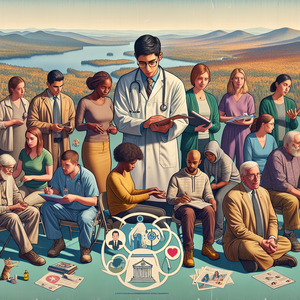
Exploring Career Paths in Physical Sciences: Opportunities, Earnings, and Educational Insights
The realm of physical sciences is an ever-evolving field, brimming with diverse career opportunities that cater to a wide array of interests and skill sets. Professionals in this domain strive to unravel the complexities of the natural world through meticulous research and experimentation. Career options span from hands-on technical roles to advanced research positions, encompassing essential jobs such as research technicians, geoscientists, water resources engineers, and forensic science technicians. These professionals not only enhance our understanding of fundamental physical laws but also tackle critical environmental and societal challenges. A formal education is usually required for these positions, with a bachelor's degree in a relevant field often serving as the minimum qualification. Advanced roles may necessitate higher degrees or specialized certifications. As the job market remains competitive, the demand for skilled individuals in key sectors like environmental science, engineering, and technology continues to grow, indicating a promising outlook for newcomers in the field. Each position contributes meaningfully to scientific progress while addressing urgent issues such as climate change and public health. This article aims to delve into various career options within the physical sciences, offering insights on job descriptions, salary expectations, educational requirements, and their broader societal impact.
Job Summaries:
Zookeeper:
- Zookeepers play a crucial role in wildlife conservation and public education.
- Caring for animals and ensuring their well-being.
- Responsibilities include feeding, cleaning habitats, and conducting health checks.
- Engaging the public through educational outreach about animal behavior.
- Typically, a background in biology or animal science is essential.
- Complemented by strong communication capabilities.
Research Technician:
- Research technicians support scientists by executing experiments and gathering data in laboratory environments.
- They manage sample preparation, maintain equipment, and analyze data, ensuring research projects proceed efficiently.
- A bachelor's degree in a scientific field, such as chemistry or biology, is generally required, alongside skills in analysis and attention to detail.
Water Resources Engineer:
- Water resources engineers concentrate on the sustainable management of water systems.
- They design solutions for water supply and wastewater treatment while evaluating environmental impacts.
- A degree in civil or environmental engineering is mandatory, alongside proficiency in relevant software and strong analytical skills.
Forensic Science Technician:
- Forensic science technicians are essential to the criminal justice system.
- Collecting and analyzing evidence from crime scenes.
- Preparing reports and may testify in court as expert witnesses.
- A degree in forensic science or a related field is typically required.
Surveyor:
- Surveyors accurately measure and map land features.
- Collaborate on construction and development projects.
- Utilize specialized equipment to define property boundaries.
- Ensure regulatory compliance.
- A degree in surveying or a related discipline is necessary.
- Strong mathematical skills are required.
Environmental Scientist:
- Environmental scientists analyze natural resources and assess human impacts on ecosystems.
- They conduct research, evaluate policies, and create conservation strategies.
- A degree in environmental science or a related field is essential, paired with strong analytical skills.
Geoscientist:
- Geoscientists investigate the Earth's materials and processes to inform resource management and hazard assessment.
- They collect samples, analyze geological data, and produce maps.
- A degree in geology or a related field is required, along with fieldwork experience.
Materials Scientist:
- Materials scientists focus on researching and developing new materials for diverse applications, from electronics to construction.
- They perform experiments and collaborate with engineers to implement their findings.
- A degree in materials science or engineering is necessary.
Chemist:
- Chemists conduct experiments to analyze substances and innovate new products.
- Primarily work in laboratory settings.
- A degree in chemistry is essential.
- Advanced roles often require a master's or Ph.D.
Astrophysicist:
- Astrophysicists explore celestial phenomena using mathematical models and simulations to deepen our understanding of the universe.
- A Ph.D. in astrophysics or a related field is typically required.
Physics Teacher:
- Physics teachers educate students on fundamental physics principles, preparing them for future studies in science or engineering.
- They design lesson plans and facilitate experiments.
- A degree in physics and teaching certification are required.
Nuclear Engineer:
- Nuclear engineers design systems that harness nuclear energy.
- Focus on safety and efficiency across various applications.
- Applications include power generation and medical uses.
- A degree in nuclear engineering is necessary.
Meteorologist:
- Meteorologists study weather patterns.
- They forecast conditions and assess climate change impacts.
- They analyze data and create models for predictions.
- A degree in atmospheric science or meteorology is required.
Oceanographer:
- Oceanographers investigate the properties of oceans to understand marine ecosystems and the effects of climate change.
- They conduct field research and analyze data to support conservation initiatives.
- A degree in oceanography or marine science is essential.
Laboratory Technician:
- Laboratory technicians assist scientists by preparing experiments and collecting samples.
- Ensuring laboratory processes run smoothly.
- A degree in a scientific discipline is usually required.
Pharmaceutical Scientist:
- Pharmaceutical scientists focus on developing and testing new medications.
- They ensure the safety and effectiveness of medications through rigorous research.
- A degree in pharmaceutical sciences is required.
Climate Scientist:
- Climate scientists examine climate change and its human impacts.
- Analyzing data to predict future scenarios.
- A degree in environmental science, meteorology, or a related field is essential.
Biochemist:
- Biochemists study chemical processes in living organisms.
- They aim to advance fields like medicine and agriculture.
- A degree in biochemistry is required.
- Further study is often needed for research roles.
Health Physicist:
- Health physicists focus on radiation safety.
- Assessing exposure levels.
- Developing safety protocols.
- A degree in health physics is essential.
Space Scientist:
- Space scientists investigate celestial phenomena through research and simulations.
- A degree in astronomy, physics, or a related field is required.
The variety of roles outlined here underscores the wealth of opportunities within the physical sciences, providing individuals with the chance to make meaningful contributions to scientific innovation and societal well-being. For those seeking to embark on a career in this field, exploring current job openings can lead to a fulfilling role that addresses the pressing challenges of our time. By choosing a path in the physical sciences, you are not only advancing your career but also participating in a broader mission to improve our world.
Explore More Jobs

